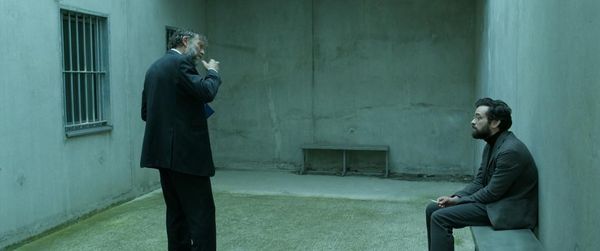Eye For Film >> Movies >> Black Tide (2018) Film Review
Black Tide
Reviewed by: Jennie Kermode

A missing child. A clumsy yet gifted alcoholic cop (with a dash of racism and misogyny on the side). A self-styled intellectual with something to hide. These are the ingredients with which Hollywood cooks up one routine thriller after another, but in French hands they combine rather differently. The first flavour to reach your lips may well be that of harengs rouges.
To begin with, the missing child is not the usual little blond girl but a sixteen year old boy. "Are you sure he hasn't got a sweetheart?" the police ask, and don't take the situation very seriously until they discover he's a pupil at the same school from which three boys set out for a jihadi training camp. Then it's game on, and detective François Visconti (Vincent Cassel) tries to reassure emotional mother Solange (Sandrine Kiberlain), who is already coping with being full-time carer to a daughter with Down syndrome (Lauréna Thellier), whilst he goes about gathering clues.

Focusing on those individuals whom the missing boy was close to, Visconti soon encounters literature teacher Yan Bellaile (Romain Duris), who lives in the same area and whose pretensions to being a writer mark him out as a man who is frustrated, unfulfilled. Nevertheless, Bellaile is far from stupid - there's a sense that Visconti resents his quieter kind of masculinity, his orderly domestic life - and as he realises he's a suspect he begins to lead the detective on a merry dance. But is any of this meaningful in terms of the central mystery? Do we buy into it easily just because cinema has taught us to? Visconti's colleagues have other ideas. There's the mysterious phone call about a body, the cruising area where the missing boy is said to have gone walking, the potential unreliability of witness statements. As the days tick by and he doesn't return home, can they hope to get to the truth?
Though Cassel's cop is a well-worn cliché (and the actor clearly knows it), the environment within which cops operate has changed. There is no tedious taking away of badges and guns but the excesses of yore are clearly not tolerated and Visconti's actions have consequences. This comes to a head in a crisply delivered scene that invites viewers to stop and think about just how much bullshit has been casually ignored in the past. Here, drunks are not always lucky and a logical, procedural approach has merit. Though he never sets it aside, director Erick Zonca is less interested in solving the mystery than in exploring the damaged psyches of Visconti and Bellaile.
Though she gets less screentime, Kiberlain also makes a big impression a the missing boy's mother, who defies the easy narratives about victimhood that are frequently attached to carers and brings her own troubling perspectives to bear as the case develops. Touching on issues around homophobia, the film also explores the way that people living in relative isolation can develop ways of thinking at odds with those of mainstream society.
A subplot dealing with Visconti's relationship with his own teenage son, who is caught up in drugs and petty crime, feels underdeveloped, probably due to lack of space - when adapting a novel one inevitably has to leave some things out - and Cassel is sufficiently skilled that it's not needed for the purposes of characterisation. Otherwise, this a taut little film whose slightly rushed ending doesn't undermine an impressive character study.
Black Tide screened under its French title, Fleuve Noir, at the 2018 Fantasia film festival.
Reviewed on: 29 Jul 2018
















